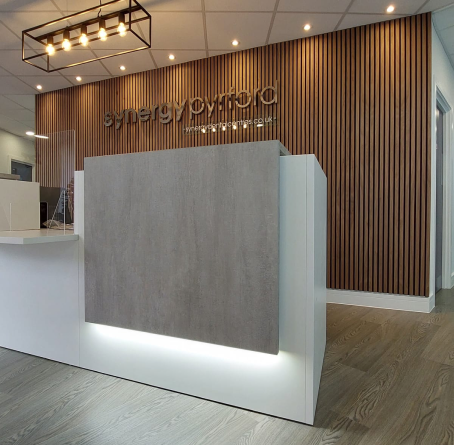Hygiene and Infection Control: Key Considerations in Dental Fitouts
Infection control is a fundamental pillar of any dental practice. A well-designed clinic does more than create a visually appealing space; it plays a crucial role in maintaining strict hygiene protocols. Ensuring high infection control standards within dental fitouts is essential in protecting patients and staff while maintaining compliance with regulatory guidelines.
From choosing the right materials to incorporating advanced technology, every element of dental clinic design contributes to minimising cross-contamination. This blog explores key considerations in hygiene-focused fitouts and how they can elevate infection control standards.
Understanding Hygiene in Dental Clinic Design
The layout and material choices within a dental clinic significantly influence hygiene levels. A poorly designed space can lead to unnecessary contamination risks, while a well-planned dental clinic design actively promotes infection prevention.
Key Hygiene Factors in Dental Design
| Factor | Importance in Hygiene |
| Non-porous Surfaces | Prevents bacterial accumulation and ensures easy cleaning. |
| Efficient Layout | Reduces movement overlap between sterile and non-sterile zones. |
| Hands-Free Fixtures | Minimises contact-based contamination. |
| Proper Ventilation | Reduces airborne pathogens and maintains air quality. |
Carefully selecting antimicrobial materials and ensuring seamless clinic flow are critical in reducing infection risks.

Infection Control Strategies in Dental Fitouts
Effective infection control is a cornerstone of modern dental clinics, ensuring patient safety and regulatory compliance. A well-planned dental fitout integrates multiple strategies to minimise contamination risks and promote a sterile environment.
- Antimicrobial Surfaces: Countertops, flooring, and seating materials should resist bacterial growth, ensuring easy cleaning and long-term hygiene maintenance.
- Hands-Free Technology: Automated taps, soap dispensers, and sensor-operated doors minimise touchpoints, reducing the spread of germs.
- Sterile and Non-Sterile Zone Separation: Clear divisions between treatment and administrative areas help prevent cross-contamination and maintain a controlled environment.
- Efficient Waste Management: Designated disposal zones for biohazardous and general waste improve safety, support compliance with regulations, and reduce infection risks.
By embedding these elements in dental fitouts, clinics can significantly enhance hygiene levels and create a safer, more efficient workspace.
Ventilation and Air Quality Control
Ensuring clean air circulation within a dental clinic is crucial for preventing airborne infections. With patients and staff constantly exposed to aerosols generated during procedures, effective ventilation strategies help minimise health risks while maintaining a comfortable environment.
Best Practices for Air Quality Management
- HVAC Systems with HEPA Filters: Capture airborne bacteria and viruses, significantly improving indoor air quality.
- Air Purifiers with UV Sterilisation: Actively reduce microbial presence in treatment rooms, offering an additional layer of protection.
- Optimised Airflow Design: Prevents stagnant air pockets and ensures continuous fresh air circulation, reducing the risk of airborne contamination.
A well-ventilated clinic is a safer environment for both staff and patients, ensuring compliance with infection control standards.
Waterline Sterilisation and Plumbing Considerations
Dental unit waterlines are susceptible to bacterial growth, making water hygiene a top priority. Effective dental fitouts should incorporate:
- Advanced Water Filtration Systems: Ensuring clean water supply for procedures.
- Regular Waterline Flushing Protocols: Reducing microbial contamination risks.
- Backflow Prevention Devices: Preventing cross-contamination in plumbing systems.
Proper plumbing design directly impacts infection control effectiveness.
Ergonomics and Hygiene Maintenance
A well-designed dental clinic must balance efficiency and hygiene, ensuring that staff can work seamlessly while maintaining strict infection control measures. Ergonomic dental clinic design enhances workflow by strategically placing essential hygiene features, reducing unnecessary movement and contamination risks.
Essential Ergonomic Hygiene Features
| Feature | Benefit |
| Strategically Placed Handwashing Stations | Ensures accessibility at crucial points to encourage frequent hand hygiene. |
| Integrated PPE Storage | Enables quick and easy access to protective gear, ensuring staff remain compliant with safety protocols. |
| Touchless Waste Bins | Reduces contact-based contamination by allowing hands-free disposal of used materials. |
| Adjustable Workstations | Customisable surfaces and equipment positioning enhance comfort while maintaining cleanliness. |
| Efficient Patient Flow Design | Minimises congestion in key areas to reduce contamination risks and enhance overall hygiene management. |
Clinics designed with ergonomics in mind not only improve staff efficiency but also contribute significantly to infection control and patient safety.
Compliance with Infection Control Regulations
Regulatory compliance is essential for any dental practice. The UK has stringent infection control guidelines that must be reflected in dental fitouts to ensure patient and staff safety. Key requirements include:
| Regulation | Requirement |
| CQC Compliance | Clinics must maintain high hygiene standards. |
| HTM 01-05 Guidelines | Sterilisation procedures and equipment handling must meet regulatory standards. |
| Health & Safety Law | Ensures a safe environment for both staff and patients. |
| Infection Prevention Best Practices | Requires implementation of proper sanitation, waste disposal, and PPE usage. |
| Air and Water Quality Standards | Clinics must adhere to ventilation and waterline hygiene requirements to prevent contamination. |
Regular staff training is also necessary to ensure ongoing adherence to these hygiene standards, reinforcing best practices in infection control.
Technology Integration for Enhanced Infection Control
Modern technology plays a crucial role in infection control. Integrating smart solutions into dental clinic design can significantly reduce contamination risks.
- Digital Record-Keeping: Minimising paperwork to reduce bacterial transmission.
- Touchless Payment Systems: Eliminating the need for physical cash handling.
- UV Sterilisation Cabinets: Keeping dental tools free from contaminants.
- Real-Time Air & Water Quality Monitoring: Detecting potential hygiene issues before they become a risk.
Leveraging technology creates a safer and more efficient clinical environment.

The Future of Hygiene-Focused Dental Fitouts
As infection control standards continue to evolve, future dental fitouts will prioritise:
- Sustainable and Eco-Friendly Materials: Reducing environmental impact while maintaining hygiene.
- AI-Powered Clinic Monitoring: Real-time tracking of sanitation protocols.
- Enhanced Automation: Minimising human touchpoints to improve hygiene levels.
- Smart Air Filtration Systems: Advanced ventilation and filtration technology to maintain superior air quality and reduce airborne pathogens.
- UV-C Sterilisation Technology: Integration of UV-C light for automatic disinfection of surfaces, tools, and high-contact areas.
Staying ahead of these trends ensures long-term success in hygiene management, creating safer and more efficient dental environments.
Conclusion
Prioritising infection control in dental clinic design is crucial for maintaining a safe, efficient, and compliant practice. Every design element, from ventilation to surface materials, must align with hygiene best practices. By integrating advanced technology, optimising clinic layouts, and following strict regulatory standards, dental practices can achieve superior infection control.
For clinics looking to elevate their infection control standards, Divo Interiors LTD offers expert solutions in dental fitouts, ensuring cutting-edge design and impeccable hygiene integration.




